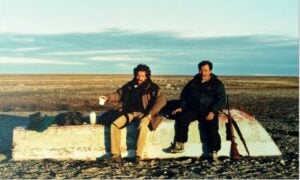
People & Culture
Kahkiihtwaam ee-pee-kiiweehtataahk: Bringing it back home again
The story of how a critically endangered Indigenous language can be saved
- 6310 words
- 26 minutes
This article is over 5 years old and may contain outdated information.
People & Culture

It’s a tale any writer worth their salt would jump on given the chance: explain what happened to Sir John Franklin’s Arctic expedition of 1845-1848, and how one of his wrecked ships was discovered by a Parks Canada-led search 167 years after it was abandoned. John Geiger, the CEO of The Royal Canadian Geographical Society, and Alanna Mitchell, an award-winning science writer, do exactly that in their new book, Franklin’s Lost Ship, which is published in October.
On how they wrote the book
John Geiger: It was difficult because I’ve written a Franklin book [Frozen in Time], and when I did, the story was one still largely of unknowing and based on studying human remains and fragments of archeological evidence; now there’s so much more to the story.
Alanna Mitchell: It’s just a great tale with an immensely interesting human narrative full of emotion and mystery. Journalists don’t often get the chance to immerse themselves in something that’s so scientifically and culturally important. So I lived it and dreamed about it at night. Franklin even appeared in my dreams, but he told me nothing!
On who stood out
AM: Marc-André Bernier [chief of Parks Canada’s Underwater Archaeology Team]. I interviewed him about what it was like exploring Erebus, and it was one of the most stunning interviews I’ve ever done. He articulated so clearly the emotional and spiritual impact it had on him, and it was such a remarkable gift to see it the way he had.
JG: Louie Kamookak [the Inuit oral historian whose work helped Parks Canada find Erebus] is pretty special. He developed a passion for Franklin and has been on a lifelong journey that relates to the search. It’s a journey his people have been on for a long time, too; nearly 170 years after the expedition, there are still in the area descendants of the Inuit who encountered Franklin’s men, and their ancestors’ testimony is still being handed down.
On how the find could redefine Canada
JG: It could be a springboard for a whole different attitude toward the North. We define ourselves as a northern people, but there’s a pervasive ignorance about the Arctic and its people, especially the Inuit. I think the book will help change that because finding Erebus has stimulated so much interest in the North. Parks Canada, with new parks and its ongoing Franklin research, has done so much in this regard.
AM: Inuit knowledge led so directly to the find, and that married the North and South in a way that perhaps hadn’t happened before. We inherited the Arctic from the British, but it was always kind of a construction. But this was the North and the South, the Inuit and the non-Inuit, working together. There’s a shift there to something that’s more cohesive and whole and modern. And it was all based on mutual respect and understanding, which is a metaphor — a new metaphor that we’re writing for Canada.
Are you passionate about Canadian geography?
You can support Canadian Geographic in 3 ways:

People & Culture
The story of how a critically endangered Indigenous language can be saved

History
Arctic historian Ken McGoogan takes an in-depth, contemporary perspective on the legacy of Sir John Franklin, offering a new explanation of the famous Northern mystery

History
Exploring the three primary theories on the locations of Franklin’s missing ships

People & Culture
On April 12, Franklin enthusiasts had a rare opportunity to come together in the same room as The Royal Canadian Geographical Society presented their 2016 Can Geo Talks